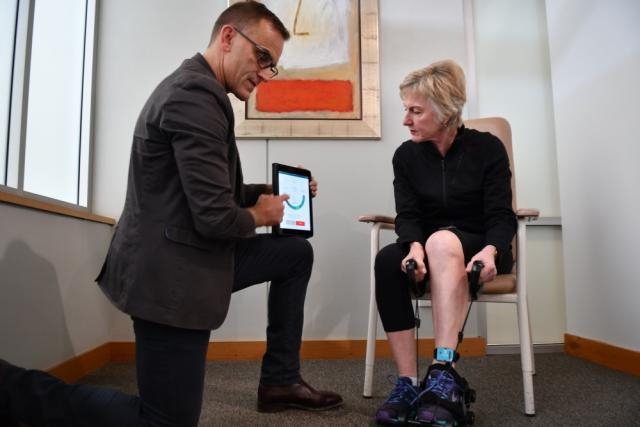A post-operative device that monitors a patient’s rehabilitation progress is now set for clinical trial, thanks to funding from the South Australian Government and Flinders University’s Medical Device Partnering Program (MDPP).
Maxm Skate, is a simple yet highly sophisticated device supplemented with an e- health software solution which empowers patients suffering lower leg knee injuries or undergoing lower limb surgery including total, partial or revision knee replacement surgery to undertake rehabilitation exercises to strengthen their lower limb muscles and enables them to monitor their own rehabilitation program.
 Developed by Orthopaedic Surgeon Dr Matthew Liptak, the roller-skate style device straps to a patient’s foot. Two sensors are then placed on the patients lower and upper leg. This combined with the intelligently crafted 4 stage MAXM exercise program provides an easy to use, transportable exercise platform that allows the patient to perform their daily rehabilitation anywhere anytime.
Developed by Orthopaedic Surgeon Dr Matthew Liptak, the roller-skate style device straps to a patient’s foot. Two sensors are then placed on the patients lower and upper leg. This combined with the intelligently crafted 4 stage MAXM exercise program provides an easy to use, transportable exercise platform that allows the patient to perform their daily rehabilitation anywhere anytime.
The sensors developed by Flinders University wirelessly transmit the user’s exercise movements to a smart phone app so they and ultimately their health professionals can visualise live data and track progress, providing a motivational tool for rehabilitation.
Due to its portable application there may be further global social and economic benefits for both city and remote patients, which will be thoroughly investigated through the upcoming ethically approved clinical trial. This may include reduced length of stay in the acute hospital setting, reduced need for post-acute inpatient hospital rehabilitation thus potentially reducing the strain on the medical/hospital systems. Other potential benefits include reduced reliance on friends and family members to transport them to and from outpatient appointments and perhaps improved return to work/health outcomes.
According to the American Academy of Orthopaedic Surgeons, total knee replacement surgeries are projected to grow to 3.5 million procedures per year in the US by 2030 and currently many people are forced to make do with improvised or passive training devices.
“Post-operative knee surgery patients are required to perform range of motion and strengthening exercises. However, there is currently no worldwide single portable device that is capable of helping patients to perform this task effectively,” Dr Matthew Liptak says.
“The skate is intended to be used up to 3 months after surgery but can be used for longer if a patient experiences benefits, and by tracking their own progress, they can be empowered and inspired to achieve their personal best outcome in real time”.
The Maxm Skate has been designed to improve joint range of motion and muscular strength after total knee reconstruction, while also decreasing pain and discomfort post-surgery. With the goal of improving patient satisfaction and outcomes.
In an article in the Australian Newspaper on March 5 2017, Dwayne Crombie, Managing Director of the health insurer Bupa, was quoted as stating Bupa spends $165 million per year on rehabilitation following joint replacement surgery within Australia, largely due to costly inpatient services.
With the global knee implant market valued at over USD $8 billion and predicted to reach USD $12.4 billion by 2024, leading to larger numbers of patients needing rehabilitation placing a further strain on the medical/hosptial systems, the future looks bright for Maxm Skate.
The MDPP is an innovative research and engagement program which is transforming the way Universities are working with industry to realise impact, and the Maxm Skate is just one example of its success.
Dr Liptak first approached the MDPP in 2013 for assistance with his device and now the project brings together six groups from South Australia, including Flinders University, Flinders Private Hospital, three service providers and local manufacturer Motherson Innovations, in the development and trial of the Maxm Skate product.
“This collaborative approach to the development of the device has been crucial and would not be possible if not for the MDPP and an openness from industry across SA to work together” said Dr. Liptak.
MDPP Director Professor Karen Reynolds says Maxm Skate is a great example of end-user led innovation, utilitising Flinders University engineering expertise and partnering with a local manufacturer in Motherson Innovations”.
“This collaboration is a great success story for South Australia, bringing positive economic and health benefits for the community” said Professor Reynolds.
Maxm will now begin a randomised blinded clinical trial investigating patient outcomes, social and economic benefits of patients post (TKR) knee replacement at Flinders Private Hospital.
Click here to view Channel 7 Adelaide news coverage.
26 June 2018